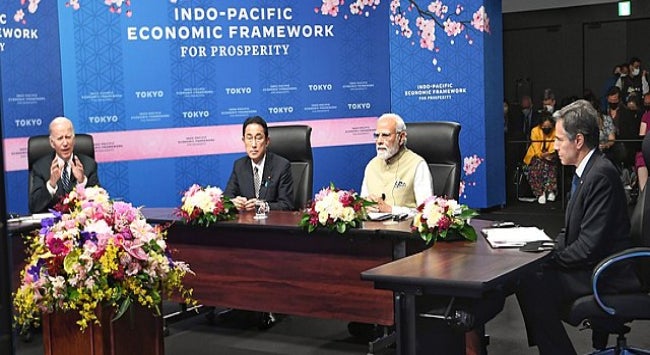Summary
The Indo-Pacific Economic Framework for Prosperity (IPEF) negotiations are expected to conclude soon. Given the delays it is facing in concluding other ongoing free trade agreements, India should focus on strong results from the IPEF. It should also join IPEF trade talks for long-term benefits.
Launched in May 2022, the Indo-Pacific Economic Framework for Prosperity (IPEF) is expected to substantially conclude its negotiations soon.
Rules have already been finalised for enhancing the resilience of supply chains. The rules for a clean economy and fair economy are likely to be announced at the forthcoming Asia-Pacific Economic Cooperation Summit scheduled in San Francisco in late November 2023. The occasion might also see some rules being announced on trade issues.
The IPEF is highly significant for India. It gives India the opportunity of contributing to economic rulemaking in the Indo-Pacific region. By participating in the rule-making process and working closely with the United States(US) and the other major IPEF members (Japan, Korea, Australia and Singapore), India can align its domestic regulations to those of the region.
Many of the IPEF’s rules will become templates for wider global adoption. Indian regulations, already aligned with those of the IPEF, will then be in sync with many other economies. This will facilitate closer integration of the Indian economy with global business and enterprise rules and operations.
The IPEF also marks India’s formal integration into the regional architecture of the Indo-Pacific being shaped by the US and its allies.
India was not invited to be a part of the Trans-Pacific Partnership (TPP) – an earlier initiative by the US – for building a rules-based framework with its allies in the Asia-Pacific region. The US eventually did not join the TPP. However, it intends to return to rulemaking leadership in the region through the IPEF that includes several of its prominent allies and former TPP associates (for example,, Australia, Brunei, Japan, Malaysia, New Zealand, Singapore and Vietnam).
The inclusion of India in the IPEF marks the intent of the US and its regional allies to bring India into the of group of ‘like-minded’ strategic allies for shaping the IPEF. It also indicates that India’s strategic value experienced a distinct elevation since the last decade.
The IPEF assumes additional significance for India due to recent developments. India’s ongoing free trade agreement (FTA) negotiations have hit roadblocks. The Canada FTA has been put on the backburner, given the dip in bilateral political ties. This is unfortunate, given that the FTA was very close to completion. The current conditions do not indicate the possibility of quick revival in talks. The India-United Kingdom FTA too has run into hitches over market access for professional service providers. Despite much of the FTA having been finalised, the remaining talks might not end soon. The India-European Union FTA has made progress but is unlikely to meet its year-end deadline for conclusion.
General elections in India are less than six months away. As they get closer, prospects of concluding the FTAs will become more difficult as the Narendra Modi government would want to avoid raking up politically sensitive market access issues, which might resonate in these FTAs.
The IPEF appears to be a more certain prospect. The US is aiming for a quick conclusion of talks before it gets into election mode from next year. The IPEF’s rules are likely to be adopted by the US administration fast and without problems as they do not need to be ratified by the US Congress. Thus, the other IPEF members do not need to worry about continuation of US leadership in the framework even after the next US elections. Notwithstanding concerns that return of the Republicans to the White House, led by Donald Trump, might lead to the US exiting the IPEF, the outcome will not be as catastrophic as the US’ exit from the TPP was. Executive rules put in place by the Joe Biden administration are likely to remain by and large secure.
Given the troubles it is facing in concluding FTAs, India should focus on abetting strong outcomes from the IPEF. It must also revisit its earlier decision to not join trade negotiations at the IPEF.
Backed by its own digital economy rules and good progress on digital trade facilitation, joining trade negotiations at the IPEF will help India in integrating closer with emerging rules in global digital trade. The IPEF trade domain is a space where working with the US and the other IPEF members, particularly close strategic allies like Japan and Australia, will help India in aligning domestic rules with global standards in a way that preserves its comparative advantage.
The long-term benefits for India from joining trade talks at the IPEF can be as much, if not more, than those visualised through its other ongoing FTAs.
. . . . .
Dr Amitendu Palit is a Senior Research Fellow and Research Lead (Trade and Economics) at the Institute of South Asian Studies (ISAS), an autonomous research institute at the National University of Singapore (NUS). He can be contacted at isasap@nus.edu.sg. The author bears full responsibility for the facts cited and opinions expressed in this paper.
Pic Credit: Wikipedia Commons
-
 More From :
More From :
-
 Tags :
Tags :
-
 Download PDF
Download PDF



